|
CONTENTS
All Out to Oppose U.S. War
Preparations on Korean Peninsula! •
To Denuclearize the Korean
Peninsula the U.S. Must Formally
End the Korean War and Make
Peace with the DPRK - Philip
Fernandez - •
U.S. Increases
Integration of Republic of Korea
into U.S. War Machine - Nick
Lin - •
Crime Against the Peace -- Canada
Extends
"Operation Neon" Against the DPRK - Margaret Villamizar -
• International Webinar Discusses Present
Situation
and Developments in DPRK
Important Anniversaries
•
Legacy of Gwangju Uprising Demands
that U.S.
Be Driven Out of Korea • North-South Joint Declarations Provide
Guidelines for Resolving Outstanding Problems Facing the Korean People
All Out
to Oppose U.S. War Preparations on Korean Peninsula! - Philip
Fernandez -  The Biden administration announced on April 30 that it had completed
its review of U.S. policy towards the Democratic People's Republic of
Korea (DPRK).
While providing no details, the White House spokesperson stated, "Our
goal remains the complete denuclearization of the Korean Peninsula.
With a clear understanding that the efforts of
the past four administrations have not achieved this objective [...]
Our policy calls for a calibrated, practical approach that is open to
and will explore diplomacy with the DPRK [...]"
The Biden administration announced on April 30 that it had completed
its review of U.S. policy towards the Democratic People's Republic of
Korea (DPRK).
While providing no details, the White House spokesperson stated, "Our
goal remains the complete denuclearization of the Korean Peninsula.
With a clear understanding that the efforts of
the past four administrations have not achieved this objective [...]
Our policy calls for a calibrated, practical approach that is open to
and will explore diplomacy with the DPRK [...]"
If
the U.S. was truly interested in denuclearizing the Korean peninsula,
there is no mystery about what must be done. The U.S. must formally end
its state of war against the DPRK by
signing a peace treaty, and engage in peaceful relations with that
country. It means ending the constant threats of military aggression
including close to 100 small and large-scale
joint-military exercises that the U.S. carries out with the Republic of
Korea (ROK), Japan and other of its allies, including Canada, as well
as threats of "decapitating" the DPRK leadership,
and threats of nuclear annihilation. It means ending the U.S.-led
brutal and illegal economic and political sanctions imposed on the DPRK
which are a form of economic warfare and
collective punishment against a small country that affirms it's right
to be and will not capitulate. These are part of the U.S. strategy to
divide the Korean people, and justify the U.S.
military presence on the Korean Peninsula with the overall aim of
regime change in the DPRK so that the entire Korean Peninsula can be
nuclearized under U.S. dictate right at the doorstep
of China and Russia. 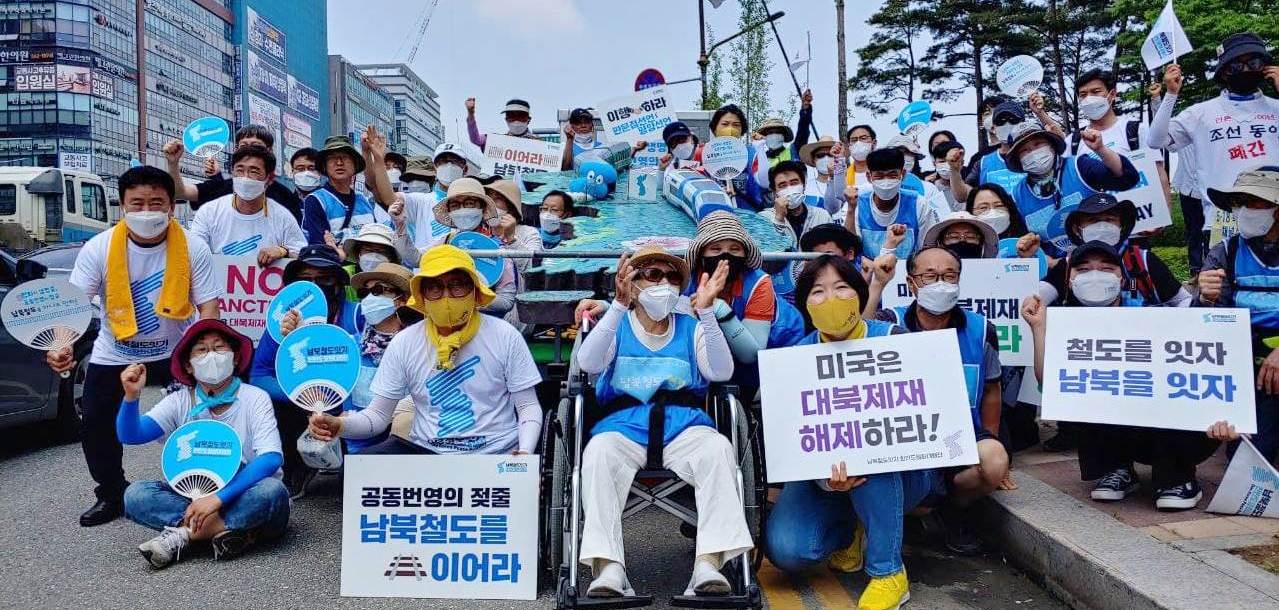
Activists
in south Korea have been marching, for more than 40 days for the One
Korea Peace Railway, with the aim of reviving and expanding the
intra-Korean railway project that was undermined by U.S. interference
in intra-Korean relations. Participants in the march include railway
workers, those whose families have been separated by the U.S. division
of Korea, as well as trade unionists, religious and civil society
organizations. Shown here, the marchers in Cheonan on June 12, 2021.
 The
DPRK has time and again made it clear that it wants peace; it wants the
Korean nation, north and south, to sort out the contradictions on the
Korean Peninsula by their own efforts,
without foreign interference and intervention. It participated in the
Six-Party Talks hosted by China between 2003 and 2009 involving itself,
China, Russia, Japan, the U.S. and the ROK to
denuclearize the Korean Peninsula but withdrew when it became clear
that the U.S. wanted the denuclearization of the DPRK, but not the
Korean Peninsula. Furthermore the U.S.
consistently violated every signed agreement of the negotiations at
every stage while continuing to weaponize the entire ROK. Today, 28,500
U.S. troops remain alongside a massive arsenal
of deadly weapons including conventional, nuclear and chemical, making
south Korea the most militarized outpost of U.S. imperialism in the
world. The
DPRK has time and again made it clear that it wants peace; it wants the
Korean nation, north and south, to sort out the contradictions on the
Korean Peninsula by their own efforts,
without foreign interference and intervention. It participated in the
Six-Party Talks hosted by China between 2003 and 2009 involving itself,
China, Russia, Japan, the U.S. and the ROK to
denuclearize the Korean Peninsula but withdrew when it became clear
that the U.S. wanted the denuclearization of the DPRK, but not the
Korean Peninsula. Furthermore the U.S.
consistently violated every signed agreement of the negotiations at
every stage while continuing to weaponize the entire ROK. Today, 28,500
U.S. troops remain alongside a massive arsenal
of deadly weapons including conventional, nuclear and chemical, making
south Korea the most militarized outpost of U.S. imperialism in the
world.
In the interests of peace the DPRK has also
signed agreements on
several occasions with the government of the ROK to end hostilities,
build trust and strengthen ties so as to overcome
more than 70 years of division forcefully imposed by the U.S. and
against the will of the Korean people. The DPRK has committed to work
with the ROK toward the peaceful reunification
of Korea based on a confederation of the two different socioeconomic
systems of north and south. The DPRK is still waiting for the ROK to
fulfill its obligations to end the joint military
exercises and other acts of aggressions based on the historic Panmunjom
Declaration signed by the two Koreas in April 2018. The
only reason the DPRK acquired nuclear weapons in the first place
-- developed through its own science and technology -- was to defend
itself against the constant nuclear and
conventional war threats and rehearsals for aggression by the U.S. and
the ROK armed forces, the latter of which remain under U.S. not ROK
command. Furthermore, it was the U.S. that
brought the first nuclear weapons into the ROK in 1958 in violation of
the 1953 Korean Armistice Agreement, and it has continued to do so.
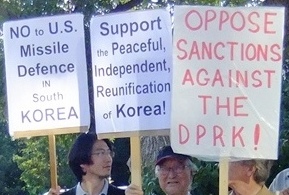 In
his Report to the 8th Congress of the Workers' Party of Korea (WPK) in
January of this year, DPRK leader Kim Jong Un emphasized that the key
to establishing a new DPRK-U.S.
relationship lies in the U.S. withdrawal of its hostile policy toward
the DPRK. Among other things, the Report clarified the WPK's stand that
it would approach the U.S. on the principle of
power for power and goodwill for goodwill in the future. In
his Report to the 8th Congress of the Workers' Party of Korea (WPK) in
January of this year, DPRK leader Kim Jong Un emphasized that the key
to establishing a new DPRK-U.S.
relationship lies in the U.S. withdrawal of its hostile policy toward
the DPRK. Among other things, the Report clarified the WPK's stand that
it would approach the U.S. on the principle of
power for power and goodwill for goodwill in the future.
However
the DPRK leader, speaking from the experience of the Korean
people with successive U.S. administrations, also said the DPRK had a
very realistic assessment of what to
expect from the outcome of the U.S. presidential elections. In his
Report to the 8th Congress of the WPK, he noted "that whoever took
power in the U.S., the real intentions of its policy
toward the DPRK would never change." The Report stressed the need for
an "adroit" strategy towards the U.S. while at the same time steadily
expanding solidarity with the anti-imperialist,
independent forces around the world. He reaffirmed
that the DPRK, has achieved such a high national
defence capability that "it can pre-emptively contain the threat of
hostile forces outside our territory, and in the future
any heightening of tensions on the Korean Peninsula would lead to the
instability of security on the part of the forces posing a threat to
us." Kim Jong Un also emphasized that the DPRK,
unlike the U.S., is "a responsible nuclear weapons state" that "will
not use its nuclear weapons unless the aggressive hostile forces try to
have recourse to their nuclear weapons against the
DPRK." 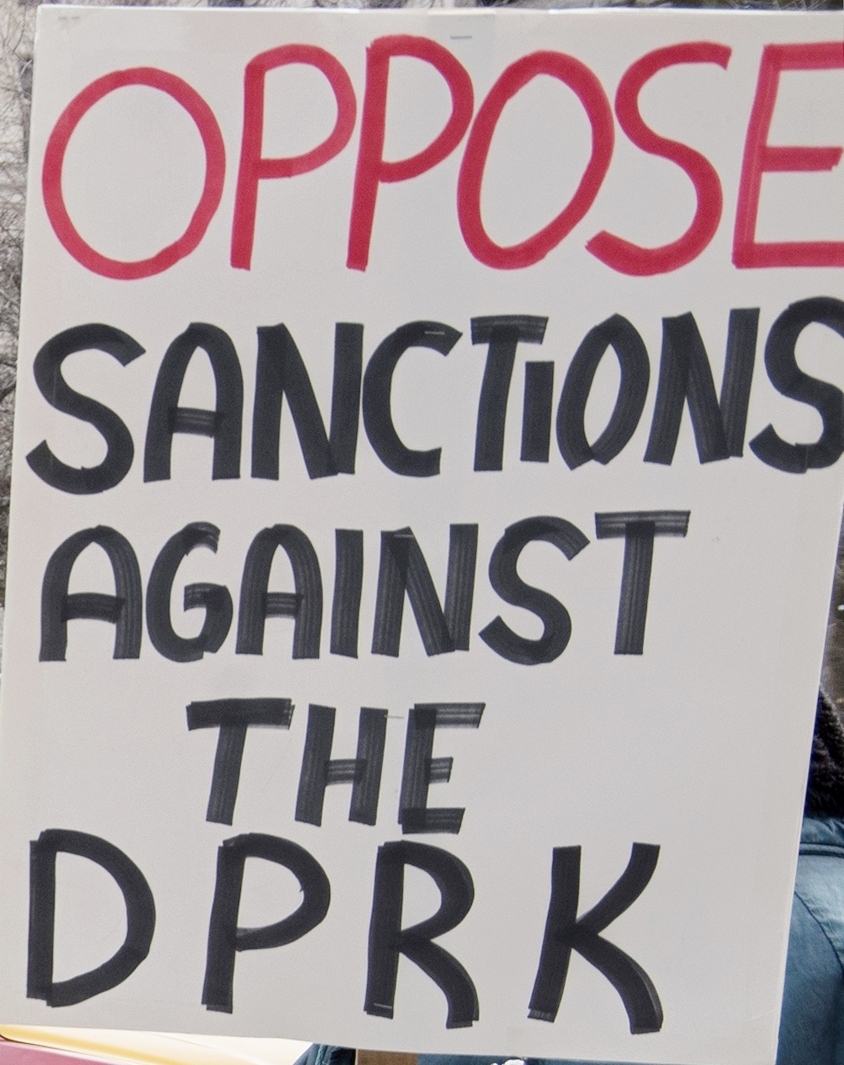 In
his address to the Joint Session of Congress on April 29, U.S.
President Biden targeted Iran and the DPRK as "threats to American
security and the security of the world" and
pledged to address these "threats posed by both of these countries
through diplomacy, as well as stern deterrence." Thus, the DPRK
leader's assessment that there would be no change to the
U.S. policy toward the DPRK with the new administration was shown to be
correct. Biden's "pragmatic approach" of "diplomacy" and "stern
deterrence" is that the ends -- which is to have
the DPRK give up its right to be -- justify the means. Such an approach
fools no one, least of all the Korean people, and like the various
self-serving approaches of previous
administrations, it will fail. No blackmail nor self-serving trickery
or use of force will succeed in getting the DPRK to come to heel. In
his address to the Joint Session of Congress on April 29, U.S.
President Biden targeted Iran and the DPRK as "threats to American
security and the security of the world" and
pledged to address these "threats posed by both of these countries
through diplomacy, as well as stern deterrence." Thus, the DPRK
leader's assessment that there would be no change to the
U.S. policy toward the DPRK with the new administration was shown to be
correct. Biden's "pragmatic approach" of "diplomacy" and "stern
deterrence" is that the ends -- which is to have
the DPRK give up its right to be -- justify the means. Such an approach
fools no one, least of all the Korean people, and like the various
self-serving approaches of previous
administrations, it will fail. No blackmail nor self-serving trickery
or use of force will succeed in getting the DPRK to come to heel.
The "human rights" disinformation that the U.S. churns out
against
the DPRK is part of its arsenal to demonize the latter and maintain a
state of war to justify its occupation of the
Korean Peninsula, to encircle China and project U.S. domination in the
Indo-Pacific region. It is also intended to deflect from its own crimes
at home and abroad, and attempt to arrest the
movement of the Korean people for peace and reunification, and divert
the world's opposition to U.S. imperialism, which is the biggest threat
to humanity and to world peace. Speaking on May 2
in opposition to the crude remarks from the State
Department spokesperson on April 28, stating that the Biden
administration will work with its allies "to raise
awareness of North Korea's egregious human rights situation,
investigate abuses and violations" on so-called "North Korea Freedom
Week,"[1]
the
DPRK Foreign Ministry underscored that the U.S. is hardly qualified to
speak on the matter of human rights, as "it has inflicted unspeakable
suffering and pain on the people of the DPRK
with its vicious hostile policy." The
DPRK Foreign Ministry cited the daily death tolls in the U.S. of
"innocent people due to social inequality and racial discrimination,"
and the latter's horrific record of more than
half a million deaths because of the inadequate intervention to stem
the COVID-19 pandemic and protect human life. The DPRK also noted that
there are more than 40,000 gun-related deaths a year in the U.S. and
pointed out that it is the U.S. that needs to
be investigated and sanctioned for gross human rights violations at
home and abroad. The DPRK condemned the U.S. as
a "human rights wasteland." The Canadian people and
the world can attest that these observations
by the DPRK are factual, and that the DPRK's call for the U.S. to be
investigated for widespread human rights
crimes at home and abroad is just. From
the time of its founding in 1948, the DPRK has stood on
principle to defend its sovereignty and independence and the honor of
the Korean nation. It has called for an end to the
U.S. military occupation of Korea and an end to all hostile acts and
acts of aggression aimed at it by the U.S. and its allies. Its heroic
efforts to maintain peace on the Korean peninsula are a contribution to
world peace and deserve the unconditional and unstinting support of all
justice- and peace-loving peoples of Canada and the world. U.S. Troops Out of Korea!
All Out for Peace on the Korean Peninsula! Note
1.
"North Korea Freedom Week" is
organized and sponsored by the Defence Forum Foundation a so-called NGO
led by former U.S. military personnel, politicians, religious leaders
and
private sector executives whose mission is "Keeping America Strong.
Promoting Freedom, Democracy and Human Rights Abroad." The President of
the organization is Suzanne Shultz, who
is also the Honorary Chairman of Free North Korea Radio, the North
Korea People's Liberation Front and a Vice- Chair of the Committee for
Human Rights in North Korea. She is also a
Board member of Christian Solidarity Worldwide-USA, all of which are
involved in constantly spewing anti-communist lies about human right
abuses in the DPRK in order to justify illegal
sanctions and other acts of war and aggression against that small
country, and to assist U.S. "diplomacy" to achieve regime change in the
DPRK.

- Nick
Lin - 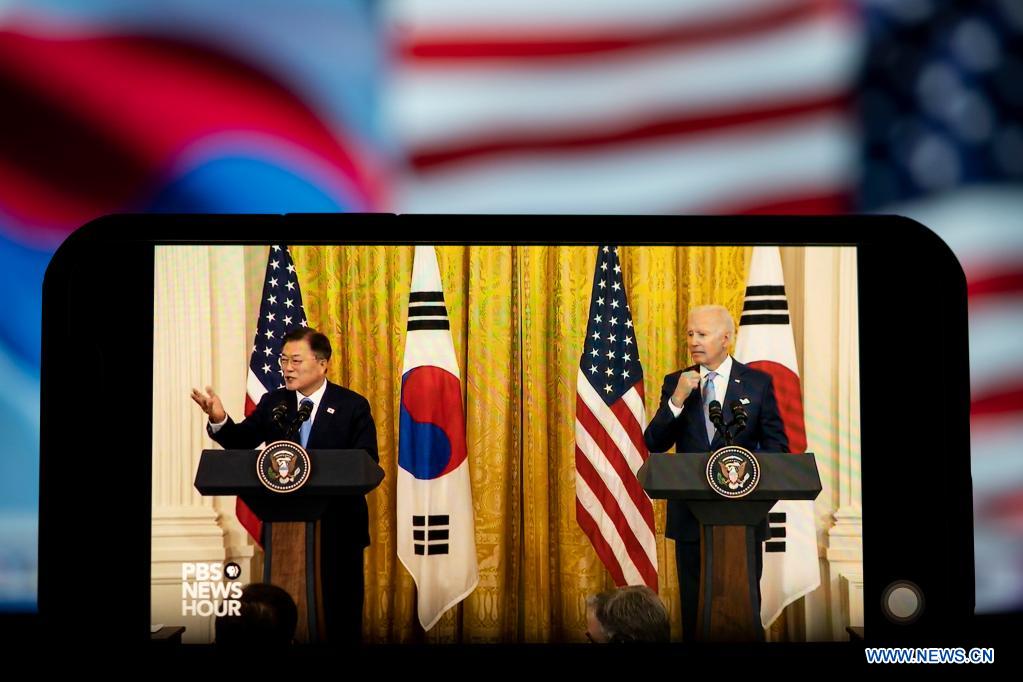 Screenshot
from press conference at the conclusion of the May 21, 2021 meeting
between President Moon Jae-in of the Republic of Korea (ROK) and U.S.
President Joe Biden. Screenshot
from press conference at the conclusion of the May 21, 2021 meeting
between President Moon Jae-in of the Republic of Korea (ROK) and U.S.
President Joe Biden.
On May 21, President Moon
Jae-in of the Republic of Korea (ROK) met
with U.S. President Joe Biden at the White House. This was the second
head of state that
Biden met face to face following the visit of the Prime Minister
Yoshihide Suga of Japan on April 16. The main aim for giving priority
to these two heads of state is for U.S. imperialism
under Biden's watch to further militarize these U.S. "allies" and
integrate them more deeply into the U.S. imperialist war machine. This
bodes ill for the peace on the Korean Peninsula, the
region and the world. At
the press
conference at the conclusion of the meeting, Biden stated, among
things, that "Our partnership is grounded in our ironclad commitment to
shared security. Our alliance has
long been the linchpin of peace, security, prosperity, and the region
growing more prominent and us being together [...] I was grateful that
our two nations were able to quickly conclude a
new cost-sharing agreement for forces in Korea in March which will
benefit both our peoples." 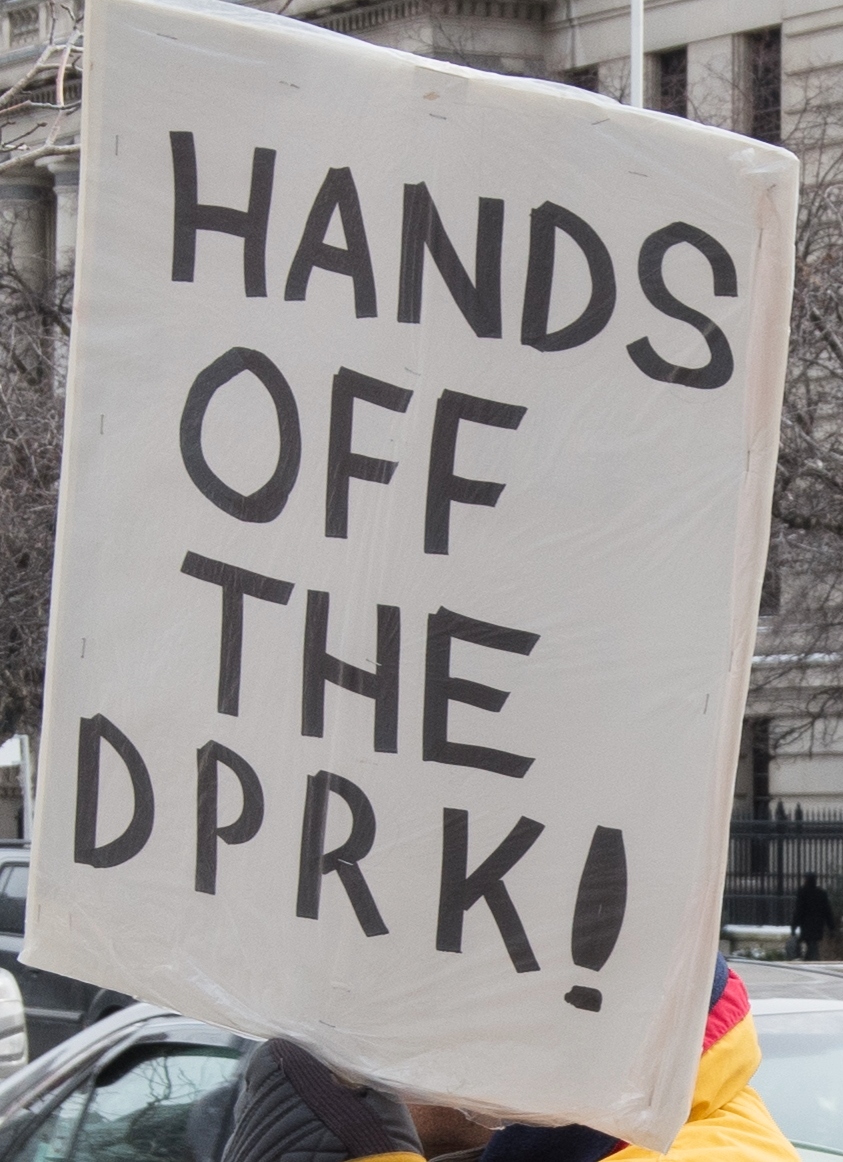 He
spoke about a "shared approach to the Democratic People's Republic in
Korea and continuing threat of the DPRK's nuclear and missile
programs... our two nations also share a
willingness to engage diplomatically with the DPRK to take pragmatic
steps that will reduce tensions as we move toward our ultimate goal of
denuclearization of the Korean
Peninsula." He
spoke about a "shared approach to the Democratic People's Republic in
Korea and continuing threat of the DPRK's nuclear and missile
programs... our two nations also share a
willingness to engage diplomatically with the DPRK to take pragmatic
steps that will reduce tensions as we move toward our ultimate goal of
denuclearization of the Korean
Peninsula."
Biden added, "The U.S.-ROK partnership
also extends beyond the goals
of the Peninsula. They address issues of regional and global concern
through stronger cooperation with partners
in the region, including the ASEAN, the Quad [the U.S., Japan,
Australia and India], and trilateral cooperation with Japan."
President Moon for his part stated that "building on past
agreements, including the Singapore joint statement, while taking a
calibrated and practical approach to seeking diplomacy with
north Korea is indeed a welcome direction of the Biden administration's
north Korea policy. During the course of the review, our two countries
closely coordinated with each other in
lockstep, which I note with much appreciation [...] President Biden
also expressed his support for the inter-Korean dialogue and
cooperation. Under close cooperation with the U.S., we will
work to facilitate progress in inter-Korean relations so as to achieve
a virtuous cycle with U.S.-DPRK dialogue. When strong security is
firmly in place, we can preserve and make peace.
Two of us agreed to further reinforce our combined defence posture and
reaffirmed our commitment to a conditions-based transition to wartime
operational control." Moon added: "It is also with
pleasure that I deliver the news on the
termination of the revised missile guidelines. The signing of ROK-U.S.
Special Measures Agreement on burden
sharing in the early days of the Biden administration displays for the
world the robustness of our alliance as a symbolic and practical
measure." The "Special Measures Agreement" forces
the people of the ROK to
foot the increasing cost of maintaining 28,500 U.S. troops and their
weapons in their country by 13 per cent to $1.3
billion U.S. this year and by 6.1 per cent annually for the next four
years, an extremely unpopular agreement with the Korean people, many of
whom want the U.S. military out of Korea.
The "revised missile guidelines" refers to the lifting of an agreement
imposed in 1979 in which the U.S. "restricted" the ROK's ability to
develop ballistic missiles of more than the current
500 km range. The "revised guidelines" will allow the ROK to develop
intermediate-range ballistic missiles with a range of 1,000-1,500
kilometres to reach targets outside the Korean
Peninsula. 
Picket outside the White House, February 15, 2021
These
statements made by Biden and Moon are a blatant provocation
against the Korean people, the peoples of East Asia and the world.
These war plans will destabilize the fragile
peace on the Korean Peninsula and are a direct act of aggression
against the DPRK and China. Moon's servility at the White House reveals
once again the level of U.S. domination of the
ROK. More crucially, what Moon said is a violation of all the
agreements to date between the two Koreas, including the June 15, 2000
North South Joint Declaration whose anniversary is
this month. When Moon put his name to the historic Panmunjom
Declaration on Peace, Prosperity and Reunification of the Korean
Peninsula on April 27, 2018, he pledged that the ROK
would work with the DPRK to promote peace on the Korean Peninsula. All
that meant nothing at the White House. To symbolize
the U.S.-ROK military alliance, Moon awarded a Medal of
Honour at the White House to 93-year-old U.S. Korean War veteran
Colonel Ralph Puckett Jr., and then
shamelessly announced, "...based on the ROK-U.S. alliance, rooted in
the noble sacrifices of our heroes, our two nations will usher a new
future together without a doubt." On May 31, the
DPRK denounced the U.S. for lifting the "revised
missiles guidelines" as providing its "ally" the ROK with a "green
light" to rapidly build up its ballistic missile arsenal
for aggression and war with neighbouring counties. It made the
observation, through international affairs expert Kim Myong Chol, that
such a decision shows who is responsible for raising
tensions on the Korean Peninsula and maintaining a double standard --
sanctioning the DPRK for its self-defence missile arsenal while
enabling its "allies" to build up their missile arsenal
with impunity. Kim astutely made the observation that this "concession"
to the ROK is actually for purposes of the U.S. tightening its grip on
south Korea. He added that the plan will
backfire because the target of the DPRK is not the ROK army but the
U.S. and underscored that the DPRK will boost its defence capability to
meet this new threat. He warned the U.S. that
"those who sow the wind will reap the whirlwind." All
peace- and justice-loving people in Canada and around the world
must denounce this latest provocation by the U.S. and its "ally" the
ROK against the Korean people. It poses grave
dangers on the Korean Peninsula and world peace. It is the principled
stand of the DPRK and firm defence of the Korean people's right to be
that has maintained peace and an equilibrium
on the Korean Peninsula. The aggressive U.S.-ROK alliance must be
dismantled and the U.S. war mongers expelled by the efforts of the
Korean people supported by all peace- and
justice-loving humanity.

- Margaret Villamizar - 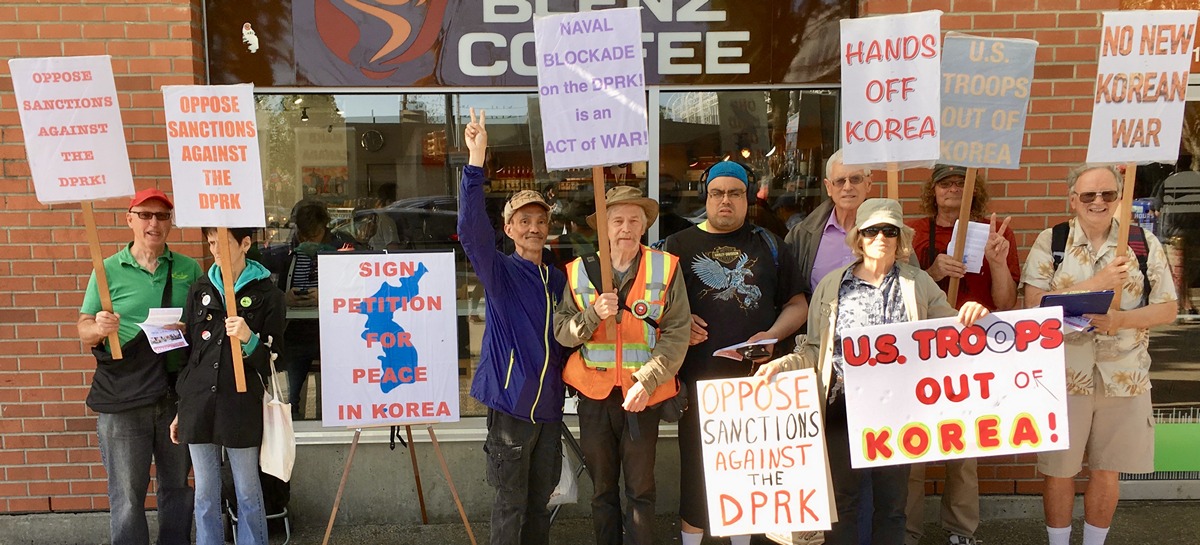
Since
2019, the Canadian military has been deployed in enforcing the UN
Security Council sanctions regime against the Democratic People's
Republic of Korea (DPRK) in what is called Operation Neon. It
is said to build upon "previous ad hoc sanctions enforcement operations
conducted in 2018." Operation
Neon
is not a UN-mandated operation but a U.S. attempt to impose a naval
blockade against the DPRK with its own posse of
“voluntary” enforcers on the high seas.[1] A recent press
release from the Department of National Defence (DND) announced that Operation Neon has
been extended until April 20, 2023. According to
the DND, Operation Neon
is "Canada's contribution to multinational efforts to monitor and deter
North Korean maritime
sanctions evasion activities and consists of Canadian Armed Forces air
and maritime assets, as well as personnel." DND cites this operation as
"a tangible and high-profile example of
Canada's commitment to the Asia-Pacific region and to countering
threats that challenge the rules-based international order."[2] The
operation is said to involve about 300 personnel and "a
naval frigate, a supply vessel, and long range patrol aircraft to
monitor maritime areas where North Korean sanctions evasion activities
are taking place, including the East China Sea." The
East China Sea is bounded by China to the west, Korea to the North,
Japan to the east and Taiwan to the south. DND further states that
"These military assets and personnel work to locate,
deter, and collect evidence on ship-to-ship transfers of sanctioned
materials (primarily, refined petroleum products such as diesel)." The
annual cost of the operation is said to be $8.3
million. Canada's appeasement of U.S. imperialist
policy in Korea and
elsewhere is nothing new and has been long opposed by Canadians from
all walks of life who do not agree with making
Canada subservient to the U.S. and its warmongering. The Canadian
government to its shame participated in the Korean War to further the
aims of the U.S. imperialists to enforce their takeover of the Korean
nation and against the Chinese
people's newly founded People's Republic. Through Operation
Neon,
amongst all the other measures Canadian governments have
taken to integrate Canada into the U.S. war machine, Canada is
enforcing the unjust sanctions regime which causes severe deprivations
that constitute violations of the
human rights of the people of the DPRK. Logic is turned on its head
when the Canadian government claims that the enforcement of arbitrary
and unjust sanctions imposed by the U.S. and
others on the DPRK constitutes upholding a rules-based international
order and defence of human rights, when in reality they violate
international law. Canada has been part of imposing
sanctions on the DPRK since 2006.
Sanctions include ones against transfer of funds to the DPRK, export of
materials
deemed to be related to arms, petroleum and
natural gas products, electronics, vehicles; the import of arms-related
materials, construction materials, ore and minerals, seafood,
agricultural produce and more. It should be kept in mind
however, that despite Canada nominally establishing official diplomatic
relations with the DPRK in 2000, it has effectively done nothing to
realize relations in practice. All of it is to give
legitimacy to the U.S. imperialists' disinformation about the DPRK.
Canada's involvement in the enforcement of sanctions in 2018
goes
back to a agreement signed on January 12 of that year in which 17
countries effectively
declared an all-out naval blockade against the DPRK. The DPRK, which
has not aggressed other countries but is only doing its utmost to
affirm its right to be, called these sanctions an act
of war. As TML Weekly pointed out at that time,
"Since the
1909 London Naval Conference, it is an accepted principle in
international law that a blockade is an act of war. As
such, its use is only permissible between belligerents. There is no
rule of international law to justify a so-called peaceful blockade,
which refers to a practice of the colonial powers of the
19th century and early 20th century. In 1916 the United States
government itself warned France: 'The United States does not recognize
that right of any foreign power to obstruct the
exercise of commercial rights of non-interested countries, resorting to
blockade when there is no state of war.'"[3]
In this way, through its participation in Operation
Neon that
constitutes an act of war, Canada is violating the terms of
the Armistice Agreement that ended the
fighting in the Korean War whose ultimate objective is to conclude
a peace treaty between the DPRK and the U.S. This is a crime against
the peace, considered the most serious war
crime under international law. Criminal activities such as Operation
Neon
must not pass and underscore the necessity for Canada to have an
anti-war government, in which
Canadians can take part in setting foreign policy that upholds
international law and peaceful relations between peoples and countries,
and does not embroil Canada in the U.S imperialist war
machine. Note 1.
According to the Department of National Defence, other countries
involved include Australia, France, Japan, New Zealand, the United
Kingdom and the United States. 2. "The
Conception of a Rules-Based International Order and the Role of
Measuring, Standards and Human Agency to Advance from Opening
to Opening," Ideological Studies Centre, TML
Supplement, June 11, 2021. 3. "Sanctions
Against the DPRK," Margaret Villamizar, TML Weekly Supplement,
January 13, 2018. 
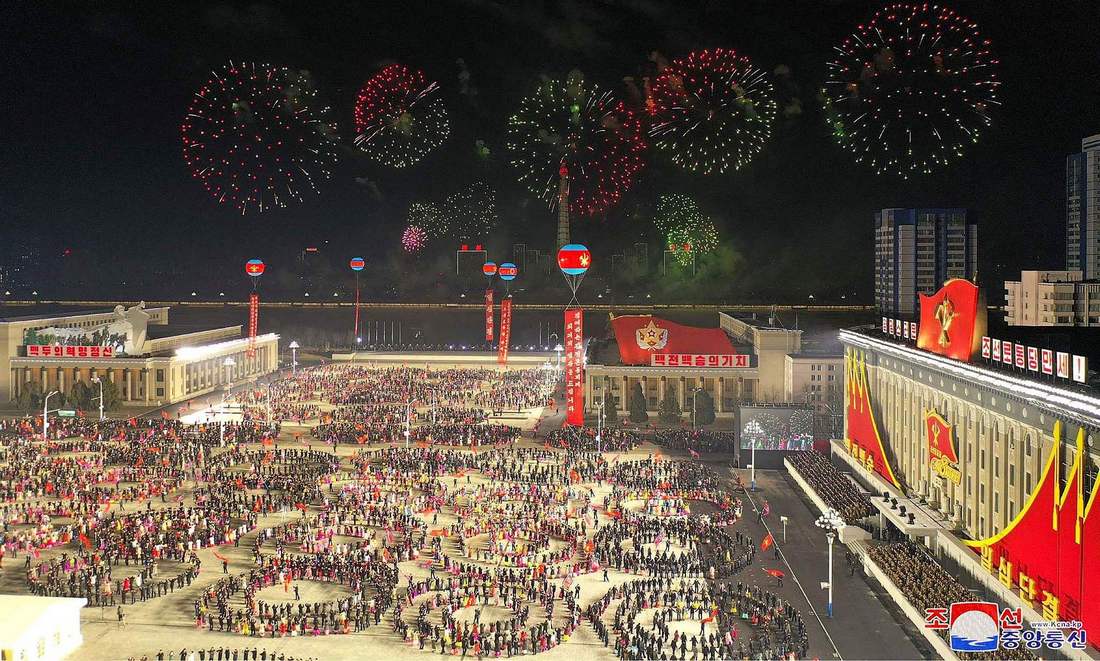
Celebration in Pyongyang of the successful conclusion of the 8th
Congress of the Workers' Party of Korea in January 2021.
On May 21, the Friends of Korea (Britain) hosted a lively and
informative webinar on the current situation in the Democratic People's
Republic of Korea (DPRK)
and the Korean Peninsula. Participants from Britain and Canada took
part in the discussion which provided a chance to learn about and
exchange views on the topic. Andy
Brooks, General Secretary of the New Communist Party of Britain and
Chair of Friends of Korea (Britain), welcomed everyone and thanked them
for joining in, especially those
from Canada. He introduced Michael Chant, General Secretary of the
Revolutionary Communist Party of Britain (Marxist-Leninist) and
Secretary of Friends of Korea (Britain), who
chaired the program. Chant set out the plan for the proceedings and
introduced Lesley Larkum -- a composer, violinist and teacher -- who
played the Korean folk song Arirang, the
anthem of the Korean reunification movement, which everyone appreciated.
In the first presentation, Michael Chant provided a historical
overview of the DPRK's struggle for its right to be during the last
more than 70 years in the face of U.S. aggression, war
and brutal sanctions. He highlighted the principled stand of the DPRK
to uphold its sovereignty and dignity under all conditions and
discussed recent developments in that country brought
into focus by the decisions taken at the 8th Congress of the Workers'
Party of Korea held in Pyongyang this past January. The main thrust of
the 8th Congress, he noted, was that it
reiterated the DPRK's determination to uphold its self-reliant Juche
outlook, strengthen its independent economy to counter the brutal
sanctions regime of the Anglo-Americans, and
defend itself against threats and aggression from the U.S. and others.
Britain is participating in the illegal sanctions the European Union
has imposed against the DPRK, Chant pointed out,
despite having withdrawn from the EU. He noted that in the current
period, the DPRK will be developing and strengthening its international
relations in support of the cause of peace and
justice everywhere, extending a hand of friendship to all who
reciprocate. Chant underscored that in terms of its relations with the
U.S., the DPRK has no illusions and will engage in
relations on the basis of "goodwill for goodwill and power for power."
The next speaker was Dermot Hudson, the Chair of the Korean
Friendship Association in the UK. He informed participants of
the Association's work to build people-to-people
relations between the two countries to support the just stands of the
DPRK in defence of peace on the Korean Peninsula and to oppose
disinformation about the DPRK carried out by the
monopoly media. One of the things Hudson noted, in light of the
atrocities that Israel is committing against the Palestinians, is that
the DPRK has always stood with the Palestinian people,
rendering material and political support over many decades. He reminded
participants that the meeting was being held on the 41st anniversary of
the Gwangju Uprising when students and
workers in that city rose up and held power for several days in May
1980 to defy the U.S.-backed Chun Doo Hwan military dictatorship in
south Korea, and affirmed their right to
democracy and empowerment. Hudson observed that May 21 too was the
first day of the Moon-Biden meeting in Washington, DC and expressed
doubt that anything good for the Korean
people would come of it. The last presenter was
Philip Fernandez, spokesperson of the Korea
Truth Commission (Canadian Chapter). He spoke of how the framework of
the Biden administration's new DPRK
policy, based on a pragmatic approach of "diplomacy and stern
deterrence," is doomed to fail because the DPRK conducts its foreign
relations on the basis of principle and upholding its
right to be. Contrary to the disinformation carried by the imperialist
system of states that the DPRK is a violator of human rights, Fernandez
pointed out that it is the crippling sanctions
imposed by the U.S, Canada, Britain and others that constitute gross
human rights violations and collective punishment against the people of
the DPRK, which is doing its utmost to defend
the rights of its people against this aggression. Fernandez
mentioned, among other things, that whenever the Korean
people have made headway in building inter-Korean relations and
strengthening the movement for reunification, the
U.S. imperialists have intervened to sabotage these efforts. In the
context of next year's elections in south Korea, Fernandez noted that
the U.S. is working behind the scenes to install the
anti-communist People's Power Party in office. This is to undermine
relations between north and south and push back the 2018 historic
Panmunjom Declaration that raised the hopes of the
whole Korean nation for the strengthening of inter-Korean relations.
One of the sitting politicians of the People's Power Party in the
legislature, Tae Yong-Ho, who defected from the
DPRK Embassy in London in 2016, has now joined the anti-DPRK campaign
to slander and isolate his birthplace, Fernandez noted. He pointed out
that in a recent interview, Tae Yong-Ho
called the DPRK a "slave state" while praising Britain as a land of
"freedom, democracy and human rights." The decisive
factor in the future of Korea are the Korean people
themselves, not anyone or any other power, and their drive for peace
and reunification will eventually succeed,
Fernandez underscored in concluding his presentation. Following
the presentations, Michael Chant informed participants
that the DPRK's embassy in London had sent a message of greeting to the
meeting and wished it success. The discussion which
ensued emphasized the importance of speaking
out in defence of the DPRK and its right to be in the context of the
continued attacks on it by the U.S. imperialists
and their allies. There was strong sentiment to continue the fruitful
discussion of this meeting. The event concluded
with a short video of a visit to a music school
in Pyongyang in 2013 during the 60th anniversary celebrations of the
Victory of the Fatherland Liberation War,
followed by a clip of the playing of The Internationale
at the close of the Workers' Party of Korea's 8th Congress.

Important
Anniversaries 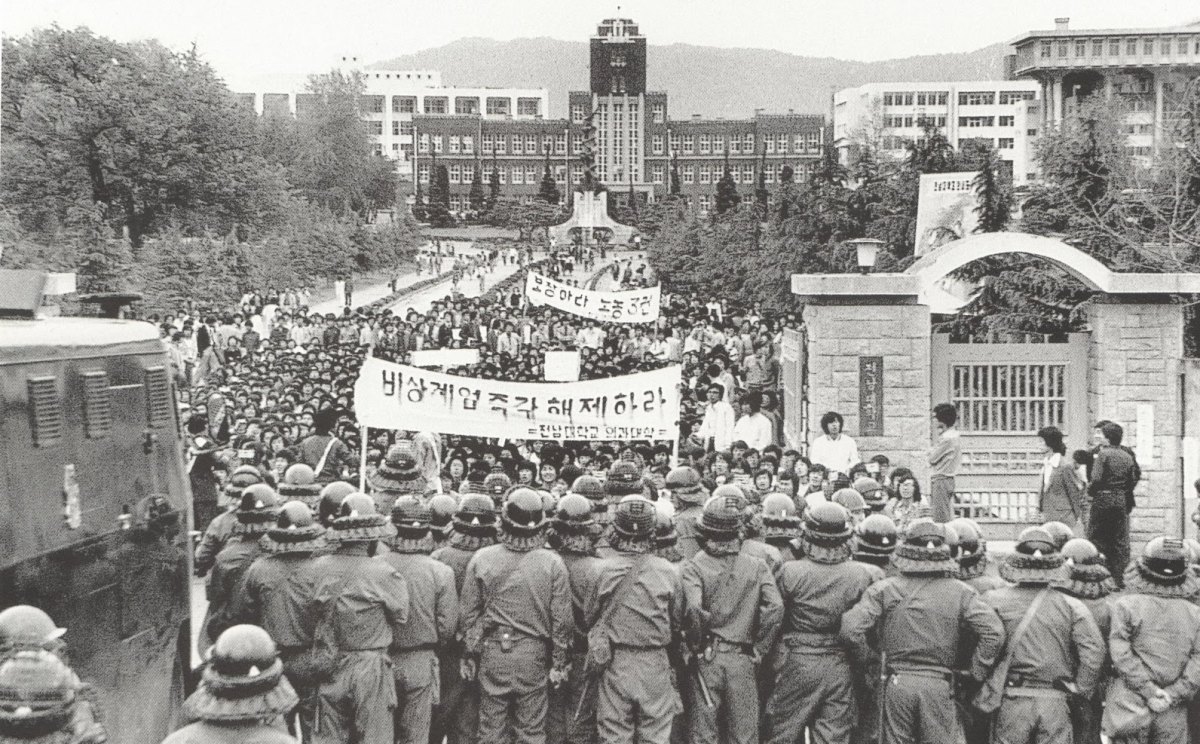
The Gwangju
People's Uprising took place in the city of that name in the southwest
of the Republic of Korea (ROK) May 18-28, 1980. It was a glorious
revolutionary initiative undertaken by the students, workers, women and
youth to affirm their right to govern their own country. They were
rising up against the U.S. domination of Korea
and the Chun Doo-hwan military dictatorship that represented it. From
the time it forcefully divided Korea at the 38th parallel following the
surrender of Japan in 1945, the U.S imperialists
strove to maintain this division by force, including launching the
Korean War on June 25, 1950 in which close to four million Korean men,
women and children perished. Thus, the
Korean
people, whose contribution to the victory of the Allies
in the Second World War was second to none, were criminally deprived of
their right to
self-determination. Instead, a U.S.-style
anti-communist government serving U.S. monopolies and Korean landlords
and capitalists was imposed in the south in 1948, in the name of
democracy, freedom and human rights. This is
the same self-serving drivel the Biden administration is peddling now
to maintain a military grip on Korea and to justify further
militarizing and integrating the ROK into the U.S. war
machine.  The
Gwangju
People's Uprising was a collective response to martial law imposed by
the Chun dictatorship in May 1980. Chun had come to power in a coup
engineered by the U.S. Carter administration after the assassination of
President Park Chung-hee, the
pro-U.S. anti-communist military dictator who ruled the ROK with an
iron fist from 1963 until his death in 1979.
Chun imposed martial law in an attempt to subdue popular actions by
the south Korean people demanding democracy and a civilian government. The
Gwangju
People's Uprising was a collective response to martial law imposed by
the Chun dictatorship in May 1980. Chun had come to power in a coup
engineered by the U.S. Carter administration after the assassination of
President Park Chung-hee, the
pro-U.S. anti-communist military dictator who ruled the ROK with an
iron fist from 1963 until his death in 1979.
Chun imposed martial law in an attempt to subdue popular actions by
the south Korean people demanding democracy and a civilian government.
According to various news and eyewitness reports, the Gwangju
People's Uprising was triggered by student demonstrations on the
morning of May 18 when some 600 students gathered
at Chonnam National University to defy the new military edict shutting
down the universities and stifling any political dissent. The police
were unable to hold the organized resistance of
people so a Special Forces unit trained for assault missions was
dispatched to quell the uprising. The Special Forces used tear gas,
batons and rubber bullets which served to widen the
resistance as workers, shopkeepers, and parents took to the streets
to defend the youth. The soldiers then opened fire, killing some 200
people and wounding hundreds more.  On May 20, some
10,000 people demonstrated against this terror and violence. Due to the
widespread militarization of the society, most major workplaces in
south Korea held caches of
weapons. Protestors seized these and commandeered buses, taxis and even
armoured personnel carriers, forming armed militias to fight the army.
A student-produced daily newspaper called Militants' Bulletin
kept everyone informed against
the disinformation of the mass media aimed at criminalizing the
rebellion and splitting their ranks. In the face of determined
armed opposition of the people, the Special Forces were forced to
withdraw. On May 20, some
10,000 people demonstrated against this terror and violence. Due to the
widespread militarization of the society, most major workplaces in
south Korea held caches of
weapons. Protestors seized these and commandeered buses, taxis and even
armoured personnel carriers, forming armed militias to fight the army.
A student-produced daily newspaper called Militants' Bulletin
kept everyone informed against
the disinformation of the mass media aimed at criminalizing the
rebellion and splitting their ranks. In the face of determined
armed opposition of the people, the Special Forces were forced to
withdraw.
The next five days were unprecedented in
ROK history. The people organized a Citizen's Settlement
Committee and a Students' Settlement Committee which worked to
organize the people and ensure the well-being of everyone. Food,
medical and transportation systems were organized and lively political
discussions took place where the people gathered to
discuss and plan their opposition and continued resistance. 
On May 24,
15,000 people attended a memorial service in honour of those who died
at the beginning of the uprising at the hands of the Special Forces. On
May 25, about 50,000
people gathered for a rally in Gwangju and adopted a resolution calling
for the abolition of martial law and the release of political prisoner
Kim Dae-jung, who would eventually be elected
the eighth President of the ROK.[1]
As the people in Gwangju continued to assert their political
demands, U.S. President Jimmy Carter, who had campaigned on a platform
for a "human rights foreign policy," intervened
directly to crush what was perceived as a threat to U.S. strategic
interests in the region. The U.S. National Security Council met at the
White House on May 24 to plan a response.
Subsequently, U.S. General John A. Wickham Jr., Commander of the
U.S.-ROK Combined Forces Command, ordered General Chun Doo-hwan to
redeploy the ROK army's 20th Division
from the De-Militarized Zone (DMZ) separating the Democratic People's
Republic of Korea (DPRK) and the ROK, to Gwangju to crush the
uprising. This plan was delayed three days
while a U.S. navy flotilla led by the aircraft carrier USS
Midway was deployed to Korean waters just in case
reinforcements were necessary.[2]
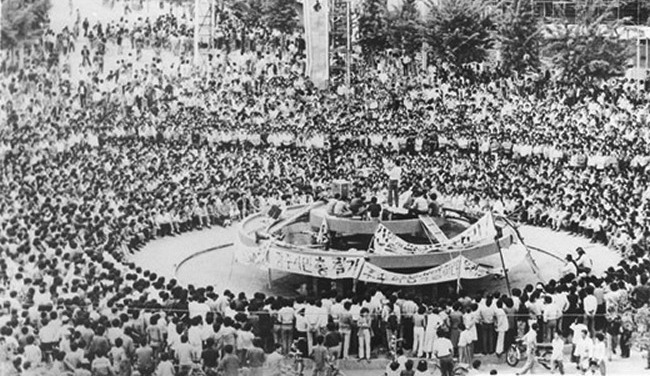
On May 27, at
3:30 am, the ROK army attacked Gwangju in Operation Fascinating
Vacations. The people of Gwangju resisted courageously
against the
U.S.-directed military assault
against them. In the ensuing battle, thousands of civilians were killed
and close to 15,000 people were injured. More than 1,500 people were
taken into custody and countless others were
tortured and summarily executed. Dozens of other activists were
arrested, tried and executed and others were thrown in prison. Within a
year General Chun had proclaimed himself President of
the ROK, and began a campaign of terror against the communists,
socialists, leftists and any other progressive forces that would
challenge his U.S.-sanctioned military rule. However the
workers and people of the ROK continued their organized opposition to
U.S. imperialism and their local puppets, and eventually ended the
military dictatorships in the ROK by the end of
1990. On the 41st anniversary of the Gwangju
People's Uprising, TML calls on everyone to
intensify their support for the heroic Korean people in their just
struggle to end the U.S.
military occupation of south Korea, to resolutely oppose the U.S.
nuclear blackmail and military provocations against the DPRK and to
vigorously support
their more than 70-year struggle to realize the independent and
peaceful reunification of their divided nation and affirm their right
to be. Hail
the
Historic Legacy of the Gwangju Uprising!
U.S. Troops Out of
Korea!
Korea Is One! 
Memorial wall to those
killed during the Gwangju People's Uprising
Notes
1.As
President of the
ROK from 1998 to 2003, Kim Dae-jung was instrumental in co-operating
with the leader of the DPRK Kim
Jong Il, to strengthen inter-Korean relations which led to the signing
of the historic June 15 North-South Joint Declaration in Pyongyang in
2000 which opened up a bold new chapter in the
struggle of the Korean people for peace and reunification. Kim was also
responsible for ensuring that the victims of U.S.-sponsored state
violence and terror in Gwangju were honoured. He
inaugurated annual memorial events for the victims beginning in 1997
and established the graveyard in Gwangju where hundreds of the victims
are buried as the National Cemetery for
the May 18th Democratic Uprising. 2. Online
database of the 4,000 declassified U.S. government documents on the
U.S. role in the Gwangju Uprising of 1980


Reunification arch in
Pyongyang, DPRK
The
anniversaries of two important joint declarations signed between the
Democratic People's Republic of Korea (DPRK) and the Republic of Korea
(ROK) occur in April and June. On June 15, 2000,
the North-South Joint Declaration was signed by the
late DPRK
leader Kim Jong Il and the late ROK President Kim Dae-jung, in
Pyongyang, the capital of the DPRK. The June 15 Joint Declaration
created the foundation for the Korean people in north and south to
strengthen ties and work together to find solutions to common problems.
In doing so they took practical measures to advance national
reunification on their own terms, and move forward together as one
united and independent country towards a bright, prosperous
future. On April 27, 2018, the
historic Panmunjom Declaration on Peace, Prosperity and Reunification
of the Korean Peninsula was signed by DPRK leader Kim Jong Un and ROK
leader Moon Jae-in at Panmunjom where the
U.S. divided Korea in 1945. These historic declarations
inspire the Korean people whose desire to achieve the peaceful
reunification of their country free of outside interference is
paramount. The people and families which comprise the Korean nation
which is one people, with a history of more than 5,000 years,
have been divided since the Korean War as a result of the U.S. refusal
to sign a peace treaty and implement the terms of the Armistice
Agreement the U.S. was forced to sign with the DPRK when, despite all
its military might and the crimes it committed against the people of
Korea, it was not able to occupy the entire Korean Peninsula.
Subsequently,
from 2000 to 2008 under the leadership of presidents Kim Dae-jung and
Roh Moo-hyun who adhered to the Joint Declaration, headway was made in
strengthening
inter-Korean relations, including the establishment of the Kaesong
Industrial Complex just north of the Demilitarized Zone in 2002. This
successful project undertaken by the DPRK and
ROK for mutual benefit involved 123 south Korean companies, employing
800
workers from the ROK and 53,000 from the DPRK producing a wide variety
of textiles, ceramics and other
products for the domestic and export markets.

Copy
of pages of North-South Joint Declaration |
The
June 15, 2000 Joint Declaration was followed by the October 4, 2007
Agreement between the ROK and DPRK, which further developed and
strengthened the progress made as a
result of the June 15, 2000 Joint Declaration. The
U.S., however, would not permit the peaceful resolution of
outstanding problems on the Korean Peninsula. It stepped up its
interference in the affairs of the ROK to get these
positive developments rolled back. It got two anti-communist, corrupt
people elected, as presidents of the ROK, Lee Myung-bak, a former mayor
of Seoul, and then Park Gyeun-hye,
daughter of the second ROK president Park Chung-hee, an anti-communist
dictator who had served in the imperialist Japanese army. They began to
sabotage the work done by the previous
administrations to foster and normalize ties with the DPRK. This
included Park Gyeun-hye's unilateral decision to end the joint project
at Kaesong in 2016. After Park Gyeun-hye was
impeached for corruption, in the May 2017
ROK presidential election Moon Jae-in succeeded in becoming president
based on his pledge to revitalize
north-south relations. By cooperating with the leadership of the DPRK,
this led to the adoption of the second historic joint declaration --
the Panmunjom Declaration for Peace, Prosperity
and Unification of the Korean Peninsula, signed between Kim Jong Un and
Moon Jae-in on April 27, 2018. This historic agreement reaffirmed all
previous agreements and went further, by
declaring, among other important measures, that the two sides would
refrain from engaging in military provocations. This declaration was
justly celebrated by the Korean people and
peace-loving humanity as a big step forward for inter-Korean relations
and for peace on the Korean Peninsula and around the world. What
has continued to be a block to the aspirations of the Korean
people and their nation-building project is the machinations and
perfidy of the U.S. imperialists, who were responsible
for the division of Korea in the first place in 1945 and who continue
to keep Korea divided today as well as a powder keg for U.S. weapons of
all types, including nuclear arms. Besides other
things, the U.S. has systematically used the UN
Security Council and its allies in the Korean War, such as Canada, to
impose ever harsher economic sanctions on the DPRK
to strangle it into submission. The military, economic and political
domination and militarization of the ROK by the U.S. imperialists and
their attempts to strangle the DPRK into
submission are all aimed at realizing the striving of the U.S.
imperialists to control all the affairs of the countries in East Asia
and the Asia-Pacific region. In the process, the U.S. has
further weaponized the ROK in order to maintain a foothold for its
armed forces on the mainland of north-east Asia and to serve as a
forward staging ground to threaten China and
Russia. 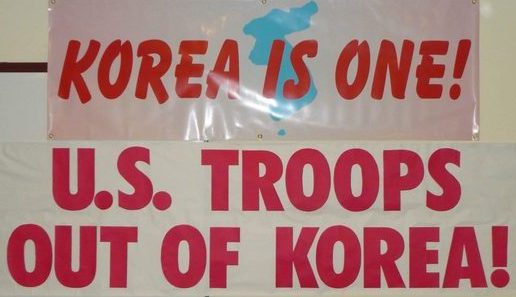 The
ROK is also one of the biggest purchasers of U.S. weapons. Despite the
fact that Point 2 of the Panmunjom Declaration states that the ROK and
DPRK will "make joint efforts to
alleviate the acute military tension and practically eliminate the
danger of war on the Korean Peninsula," in practice this has not yet
been possible and activists for peace and reunification
continue to work assiduously to disentangle the south from the U.S.
military and its aggressive aims in the region.[1] The
ROK is also one of the biggest purchasers of U.S. weapons. Despite the
fact that Point 2 of the Panmunjom Declaration states that the ROK and
DPRK will "make joint efforts to
alleviate the acute military tension and practically eliminate the
danger of war on the Korean Peninsula," in practice this has not yet
been possible and activists for peace and reunification
continue to work assiduously to disentangle the south from the U.S.
military and its aggressive aims in the region.[1]
Whatever the self-serving machinations of the U.S.
imperialists and
their appeasers in Canada and elsewhere, the fact remains that the
decisive factor for peace on the Korean Peninsula
and the reunification of the Korean nation are the Korean people
themselves, along with the peace-loving peoples of the world taking
action in concert with them. It is this spirit that is
enshrined in the June 15, 2000 Joint Declaration, which the Korean
people will never permit to be erased. It is their defiance of U.S.
threats and dictate that give expression to the three
principles guiding the Korean reunification movement: reunification
will be achieved independently without outside interference, through
the political unity of the Korean people despite
their ideological differences, and peacefully. There
is no better time than the 21st anniversary of the June 15,
2000 Joint Declaration, for the Canadian people to step up providing
support for the courageous and determined
struggle of the Korean people to achieve peace, reunification and
progress for Korea. 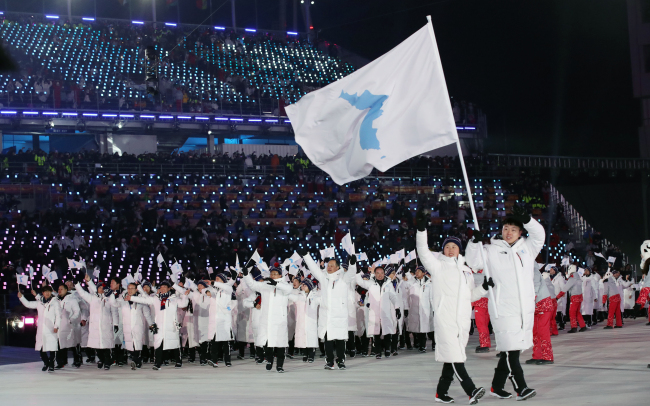
Korean
athletes from the north and south enter opening ceremony of the
Pyeongchang Olympics, February 9, 2018, under the reunification flag.
Note 1.
In 1953 following
the Korean War, the ROK-U.S. Mutual Defense Treaty was imposed by the
U.S. which forces the ROK to take
part in the annual Key Resolve and Foal Eagle war games that are thinly
veiled attempts to threaten the DPRK and its supporters China and
Russia. 
(To
access articles individually click on the black headline.) PDF
PREVIOUS
ISSUES | HOME
Website: www.cpcml.ca
Email: editor@cpcml.ca | 
 The
ROK is also one of the biggest purchasers of U.S. weapons. Despite the
fact that Point 2 of the Panmunjom Declaration states that the ROK and
DPRK will "make joint efforts to
alleviate the acute military tension and practically eliminate the
danger of war on the Korean Peninsula," in practice this has not yet
been possible and activists for peace and reunification
continue to work assiduously to disentangle the south from the U.S.
military and its aggressive aims in the region.[1]
The
ROK is also one of the biggest purchasers of U.S. weapons. Despite the
fact that Point 2 of the Panmunjom Declaration states that the ROK and
DPRK will "make joint efforts to
alleviate the acute military tension and practically eliminate the
danger of war on the Korean Peninsula," in practice this has not yet
been possible and activists for peace and reunification
continue to work assiduously to disentangle the south from the U.S.
military and its aggressive aims in the region.[1]
 The Biden administration announced on April 30 that it had completed
its review of U.S. policy towards the Democratic People's Republic of
Korea (DPRK).
While providing no details, the White House spokesperson stated, "Our
goal remains the complete denuclearization of the Korean Peninsula.
With a clear understanding that the efforts of
the past four administrations have not achieved this objective [...]
Our policy calls for a calibrated, practical approach that is open to
and will explore diplomacy with the DPRK [...]"
The Biden administration announced on April 30 that it had completed
its review of U.S. policy towards the Democratic People's Republic of
Korea (DPRK).
While providing no details, the White House spokesperson stated, "Our
goal remains the complete denuclearization of the Korean Peninsula.
With a clear understanding that the efforts of
the past four administrations have not achieved this objective [...]
Our policy calls for a calibrated, practical approach that is open to
and will explore diplomacy with the DPRK [...]"
 The
DPRK has time and again made it clear that it wants peace; it wants the
Korean nation, north and south, to sort out the contradictions on the
Korean Peninsula by their own efforts,
without foreign interference and intervention. It participated in the
Six-Party Talks hosted by China between 2003 and 2009 involving itself,
China, Russia, Japan, the U.S. and the ROK to
denuclearize the Korean Peninsula but withdrew when it became clear
that the U.S. wanted the denuclearization of the DPRK, but not the
Korean Peninsula. Furthermore the U.S.
consistently violated every signed agreement of the negotiations at
every stage while continuing to weaponize the entire ROK. Today, 28,500
U.S. troops remain alongside a massive arsenal
of deadly weapons including conventional, nuclear and chemical, making
south Korea the most militarized outpost of U.S. imperialism in the
world.
The
DPRK has time and again made it clear that it wants peace; it wants the
Korean nation, north and south, to sort out the contradictions on the
Korean Peninsula by their own efforts,
without foreign interference and intervention. It participated in the
Six-Party Talks hosted by China between 2003 and 2009 involving itself,
China, Russia, Japan, the U.S. and the ROK to
denuclearize the Korean Peninsula but withdrew when it became clear
that the U.S. wanted the denuclearization of the DPRK, but not the
Korean Peninsula. Furthermore the U.S.
consistently violated every signed agreement of the negotiations at
every stage while continuing to weaponize the entire ROK. Today, 28,500
U.S. troops remain alongside a massive arsenal
of deadly weapons including conventional, nuclear and chemical, making
south Korea the most militarized outpost of U.S. imperialism in the
world. In
his address to the Joint Session of Congress on April 29, U.S.
President Biden targeted Iran and the DPRK as "threats to American
security and the security of the world" and
pledged to address these "threats posed by both of these countries
through diplomacy, as well as stern deterrence." Thus, the DPRK
leader's assessment that there would be no change to the
U.S. policy toward the DPRK with the new administration was shown to be
correct. Biden's "pragmatic approach" of "diplomacy" and "stern
deterrence" is that the ends -- which is to have
the DPRK give up its right to be -- justify the means. Such an approach
fools no one, least of all the Korean people, and like the various
self-serving approaches of previous
administrations, it will fail. No blackmail nor self-serving trickery
or use of force will succeed in getting the DPRK to come to heel.
In
his address to the Joint Session of Congress on April 29, U.S.
President Biden targeted Iran and the DPRK as "threats to American
security and the security of the world" and
pledged to address these "threats posed by both of these countries
through diplomacy, as well as stern deterrence." Thus, the DPRK
leader's assessment that there would be no change to the
U.S. policy toward the DPRK with the new administration was shown to be
correct. Biden's "pragmatic approach" of "diplomacy" and "stern
deterrence" is that the ends -- which is to have
the DPRK give up its right to be -- justify the means. Such an approach
fools no one, least of all the Korean people, and like the various
self-serving approaches of previous
administrations, it will fail. No blackmail nor self-serving trickery
or use of force will succeed in getting the DPRK to come to heel.
 Screenshot
from press conference at the conclusion of the May 21, 2021 meeting
between President Moon Jae-in of the Republic of Korea (ROK) and U.S.
President Joe Biden.
Screenshot
from press conference at the conclusion of the May 21, 2021 meeting
between President Moon Jae-in of the Republic of Korea (ROK) and U.S.
President Joe Biden. He
spoke about a "shared approach to the Democratic People's Republic in
Korea and continuing threat of the DPRK's nuclear and missile
programs... our two nations also share a
willingness to engage diplomatically with the DPRK to take pragmatic
steps that will reduce tensions as we move toward our ultimate goal of
denuclearization of the Korean
Peninsula."
He
spoke about a "shared approach to the Democratic People's Republic in
Korea and continuing threat of the DPRK's nuclear and missile
programs... our two nations also share a
willingness to engage diplomatically with the DPRK to take pragmatic
steps that will reduce tensions as we move toward our ultimate goal of
denuclearization of the Korean
Peninsula."



 The
Gwangju
People's Uprising was a collective response to martial law imposed by
the Chun dictatorship in May 1980. Chun had come to power in a coup
engineered by the U.S. Carter administration after the assassination of
President Park Chung-hee, the
pro-U.S. anti-communist military dictator who ruled the ROK with an
iron fist from 1963 until his death in 1979.
Chun imposed martial law in an attempt to subdue popular actions by
the south Korean people demanding democracy and a civilian government.
The
Gwangju
People's Uprising was a collective response to martial law imposed by
the Chun dictatorship in May 1980. Chun had come to power in a coup
engineered by the U.S. Carter administration after the assassination of
President Park Chung-hee, the
pro-U.S. anti-communist military dictator who ruled the ROK with an
iron fist from 1963 until his death in 1979.
Chun imposed martial law in an attempt to subdue popular actions by
the south Korean people demanding democracy and a civilian government. On May 20, some
10,000 people demonstrated against this terror and violence. Due to the
widespread militarization of the society, most major workplaces in
south Korea held caches of
weapons. Protestors seized these and commandeered buses, taxis and even
armoured personnel carriers, forming armed militias to fight the army.
A student-produced daily newspaper called Militants' Bulletin
kept everyone informed against
the disinformation of the mass media aimed at criminalizing the
rebellion and splitting their ranks. In the face of determined
armed opposition of the people, the Special Forces were forced to
withdraw.
On May 20, some
10,000 people demonstrated against this terror and violence. Due to the
widespread militarization of the society, most major workplaces in
south Korea held caches of
weapons. Protestors seized these and commandeered buses, taxis and even
armoured personnel carriers, forming armed militias to fight the army.
A student-produced daily newspaper called Militants' Bulletin
kept everyone informed against
the disinformation of the mass media aimed at criminalizing the
rebellion and splitting their ranks. In the face of determined
armed opposition of the people, the Special Forces were forced to
withdraw.



